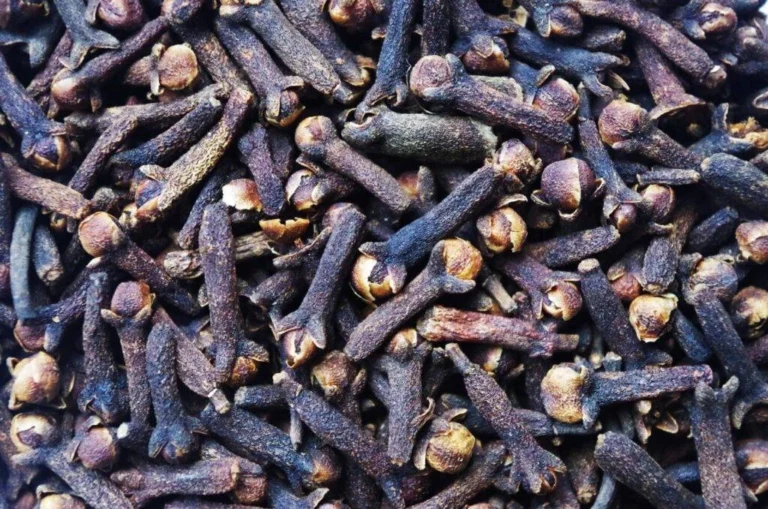Citronella Essential Oil

Clove Essential Oil
Clove Syzygium aromaticum
Plant Family Myrtaceae
Synonyms
Eugenia caryophyllata Thunb, Eugenia aromatica L.
Origin
Clove trees originated in Asia and have been cultivated for at least 2000 years. The flower buds are dried to produce the spice trade since sixteenth century. Today the main centers of cultivation are Zanzibar, Madagascar and Indonesia. Preparation of clove have been used medicinally for thousands of years to treat skin infections and infestations, digestive disorders and toothache
Extraction Method
Steam distillation of the buds as well as from leaves and stems. It is necessary up to 6-8 kg of buds or 10-15 leaves and stems to obtain 1 kg of essential oil.
Nature of the Oil
Clove bud: a pale yellow liquid. The aroma is sweet and spicy with a pleasantly sharp top-note. Clove leaf: a dark amber liquid with a harsh dry odour. Clove stem: a pale yellow liquid whose odour is reminiscent of clove bud oil.
Perfumery Note – Base to middle. General Effect is antiseptic and warming. Clove essential oil a warm, sweet and spicy, strong fragrance. At the same time tangy and dry.
The oil is highly odoriferous, so use sparingly.
Main Constituents
| Eugenol | 77.0 – 88.0% |
| beta-Caryophyllene | 3.5 – 6.4% |
| alpha -Caryophyllene | 0.8-1.4% |
| Eugenyl acetate | tr-1.2% |
| Isoeugenol |
Properties
strong appetite stimulant; anti-spasmodic; aphrodisiac; nerve tonic; analgesic; against fungi and parasites, strong antiseptic and bactericide, supports scar formation; for skin ailments, bronchial diseases, intestinal disturbances; lowers blood pressure; against infection in tooth area and regeneration of gums.
Therapeutic Properties
Clove is a warming and stimulating oil. It is a powerful antiseptic and highly appropriate for use in infectious diseases and the treatment of septic wounds and ulcers. It also aids the formation of scar tissue. When using clove oil on the skin it must be very well diluted or it may be an irritant; do not use in dilutions stronger than 2% and do a patch test on a small area of skin first. It is a useful addition to a room spray for fumigating a room — combine it with other strongly antiseptic oils such as bergamot, eucalyptus, lavender and thyme.
Cloves also have anti-neuralgic properties, hence the oil’s well-known use for soothing the pain of toothache or an abscess. To relieve toothache, half-fill an eggcup with warm water, mix in two drops of clove oil, soak a small piece of cotton wool in the dilution and then place against the painful tooth.
Clove has anti-rheumatic and pain- relieving properties beneficial in the treatment of rheumatism, arthritis and muscular sprains and strains. Dilute well and use in a rubbing oil.
Its stimulating action makes clove an appropriate addition to oils such as rosemary for stimulating the memory and concentration. Use in an essential oil burner. Its warming and stimulating properties also make it aphrodisiac. Clove has antispasmodic and carmi- native properties and can be of use in relieving flatulence, dyspepsia and diarrhoea from a chill. Dilute well in a base oil and massage over the abdomen. Its warming and antiseptic action means it is a good treatment for colds, flu and chills. It will also help to strengthen the immune system.
Clove is a useful insect repellent and parasiticide. It is of particular use against scabies; combine with cedar- wood, cinnamon and lemon in a base oil and apply to the skin. To eliminate fleas and moths, combine with eucalyptus, lavender and lemon and use in a plant spray.
Aromatherapeutic Uses
Although some aromatherapists use clove bud oil on the skin for condition such as acne, athelete‘s foot and as an insect repellent, I would not recommend this (see cautions). However, it can be used in a vapoviser as a room scent or fumigant, or as a first-aid measure for toothache while awaiting dental treatment.
Psychological Profile
The odour effect of clove bud oil is warming and stimulating; a reputed aphrodisiac. Stimulates mental activity, both activating and balancing. Helps to relieve tension.
Clove oil is appropriate if you are generally a cheerful, outgoing and optimistic person but have been brought down by an illness, infection or trauma. You may have been suffering with a recurrent or painful condition for some time and are now becoming increasingly despondent and fed up. Using clove will help to impact a sense of warmth and cheerfulness and restore your sense of optimism and enjoyment of life.
Blends Well With
Citrus essences, clary sage, eucalyptus, lavender, geranium, jasmine, neroli, rose, ylang ylang, thyme.
Our safety advice
We recommend a dermal maximum 0,6% based on 88% eugenol content and a limit of 0,5 % . As with the essential oil no restrictions are required, in our opinion, with regard to carcinogenesis.
Cautions
Clove oil is highly irrittating to skin and mucous membranes. Therefore, it is advisable for the home user to avoid skin applications and steam inhalations of any type of clove oil, However, it can be used in a vapoviser as a fumigant or room scent.
References
1. C. Wildwood “The Encyclopedia of Aromatherapy”, Vermont, Healing Arts Press, 1996
2. R. Tisserand, R. Young, E. M Williamson “Essential Oil Safety. A Guide for Health Care Professionals”, Churchill Livingstone ELSEVIER, 2014
3. S. Curtis “Essential Oils”, AURUM, London, 1996
4. R. Balz “The Healing Power of Essential Oils”, LOTUS LIGHT SHANGRI-LA, Twin Lakes, 1996
5. Л.ГДудченко, Г.П.Потебня, Н.А.Кривенко «Ароматерапия и аромамасаж», «Максимум», Киев, 1999
